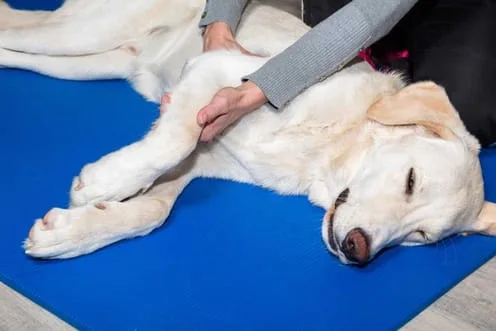What are Forelimb (Front Leg) Injuries in Dogs?
Your dog's front legs, also called forelimbs, are used to support all weight-bearing activities including running, jumping, walking, and going up and down stairs. It's not uncommon for a dog to sustain an injury or illness affecting one or even both of its forelimbs. Mild forelimb injuries may resolve on their own, but many will require specialized treatment from a veterinary surgery or regenerative medicine team.

What are the Common Signs and Symptoms of Forelimb Injuries in Pets?
In most cases, pet parents can tell when their family pet is struggling with an injury or illness affecting their forelimb, even if they're not exactly sure of the underlying diagnosis. Key signs and symptoms of a forelimb injury that could signify the need to see a orthopedic veterinary surgeon include:
- Muscle weakness and muscle wasting in the limb (also known as atrophy)
- Swollen and/or tender joints
- Bruising on the forelimb (depending on your dog's skin tone and coat)
- Pain while weight-bearing on the forelimb (your dog may hold its paw up or limp)
- Lameness and difficulty with mobility (your dog may struggle to get up off the floor or have a hard time going up and down stairs or in and out of a car)
- Decreased range of motion in the forelimb
What are the Common Types & Causes of Canine Forelimb Injuries?
Forelimb injuries in four-legged athletes vary broadly in terms of severity, type, and duration. The anatomical structure of your pet's forelimb is relatively intricate, complete with muscles, tendons, ligaments, joints (including shoulder, elbow, and carpus joints), bones, and other connective tissues. One or several of these structures can be impacted by illness or injury, including:
Shoulder
- Osteochondrosis Dissecans (OCD)
- Fractures (Greater Tubercle and Supraglenoid Tuberosity)
- Medial Shoulder Instability (Rotator Cuff Injury)
- Biceps Tendinopathy
- Supraspinatous Tendinopathy
- Osteosarcoma (Cancer)
Elbow
- Fragmented Medial Coronoid Process (FCP)
- Osteochondrosis Dissecans (OCD)
- Ununited Anconeal Process (UAP)
- Joint Incongruity
- Angular Limb Deformity
- Fracture of the Humeral Condyle
Carpus
- Carpal Osteochondrosis Dissecans (OCD)
- Carpal Bone Fractures/Luxations
- Ligamentous Injury
What's Causing my Pet's Forelimb Injury?
Understanding the cause of your pet's forelimb injury will play a significant role in the treatment plan, which is why it's very important to get a referral to an orthopedic veterinarian who can thoroughly investigate your dog's presentation. Common causes of forelimb injuries that we've seen in our veterinary surgery practice include:
- Repetitive, progressive, chronic stress on the forelimb
- Acute and frank injuries or trauma (such as car accidents or sudden slips, trips, or falls while running)
- Congenital abnormalities or developmental disorders
- Parasite-borne illnesses
- Complications from other chronic health conditions
How Is a Forelimb Injury Diagnosed?
When pet parents come to see us, by referral from their veterinarian, our orthopedic veterinary team will take the time and care needed to thoroughly evaluate your pet. This helps us determine the underlying diagnosis that is causing the animal's forelimb pain and dysfunction. We use advanced diagnostic tools, equipment, and techniques to identify the cause (or causes) of your pet's condition. We then use this information to help develop and implement the most appropriate treatment plan.
Of course, not every forelimb injury is the same, so our treatment plans are customized to meet the specific needs of each pet. Treatment plans can consist of surgery, regenerative medicine, or rehabilitation, and our doctors will help you decide what is best for you and your pet.
Click Here To Learn More About Osteochondrosis Dissecans (OC)
Is Your pet Showing Signs & Symptoms of A Forelimb Injury? Request A Referral To See Our Orthopedic Veterinarian Team in Omaha
If you've been worried about your pet's behavior recently and are wondering if it's been affected by a forelimb injury, then schedule an appointment with your primary veterinarian as soon as possible. If undiagnosed and untreated for too long, a small forelimb injury can progress into a bigger one that may be harder and more expensive to treat. It is possible that your veterinarian will refer you to an orthopedic veterinarian, such as those on staff at Sirius Veterinary Orthopedic Center. If so, we encourage all pet parents to read this helpful page to prepare for any upcoming visits. You can also call our friendly and compassionate staff at (402) 934-1332 with questions or concerns.

